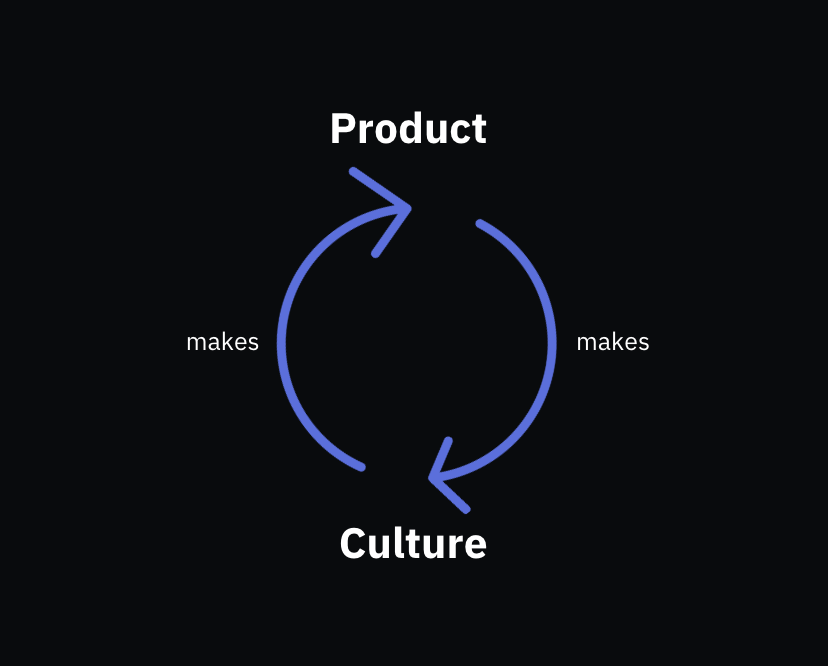Product makes culture makes product
It was a few years ago when I worked for a company called Tapingo as a developer. The company did very well and like every small tech company I hear of, we suffered from scaling issues with our ordering service, billing service, and more... That wasn't conducive to business. In order to find a solution, the tech manager had us all attend a meeting. Every developer immediately started developing solutions. One of the things a colleague said after 45 minutes into the meeting was "Why add more rules when you can force it with technology...". I thought it was smart since it reduced the number of rules for managers to enforce and IT to keep track of - humans make mistakes. We created a culture of automation and found solutions
We ended up building some tech with auto scaling but the important thing was that reality was so much better, that we could not go back to manual operation and always looked and found how we automate logic that will make tech managers invent rules because the tech and the culture are provided by the tools we use. We adopted this idea. Unlike technology, culture is something that stays and is adopted by people.
The use of smartphones in a past organization where I worked is another example. There I was issued with a cell-phone, along with me and many others with similar jobs. This meant that I was supposed to work all the time, to be available, and be very engaged. This technology changed the way we interacted and in fact shifted our culture. Today, this is common as everyone has smart phones and therefore some of that culture has stayed and evolved with the years.
Personally, I think Slack is a great example from my perspective. If you are in tech, only if you are a fully Microsoft organization have you used Slack. They offer collaboration, however, if you use it correctly and not only with bots that QA and Tech use, it is a brainstorming tool, it creates transparency, helps individuals be organized, and much more. Back at Tapingo, Guy, a fellow iOS developer, introduced me to it. It had the feeling of every-other-chat-app and yet the way we utilized it and the uniqueness, made decision making feel and truly be different. We were very engaged, we learned more about fellow teams and challenges. It made a cultural difference. When I left Tapingo and joined Yehoyada in our (a success) venture to introduce transparency in the Israeli education market, I thought of Slack as a tool to use in the office. It was open, easy to use, helped the team share, and be transparent - all the core values we wanted in the company. (At that time I was unable to assess the company's culture and the positive things I thought it could bring, were not accepted very well - talk about this in a future post)
I think that Slack product managers wanted X KPIs and they had goals. However, the true high goal (I would think) is to make a culture change and create the adoption for the clients organization. Because this is a very strong indicator that the product "infiltrated" the hearts of the users.
I took a culture from one company and tried to implement it in another one. Like myself, Slack grew.
Slack Apps and Integrations: To enhance Slack functionality, a wide range of apps and integrations have been developed. These include project management tools like Trello and Asana, file-sharing platforms like Google Drive and Dropbox, and productivity apps like Google Calendar and Zoom. These integrations have made it easier for teams to collaborate, share files, manage tasks, and conduct meetings within the Slack platform.
Slack Connect: Slack Connect allows organizations to communicate and collaborate with external partners, vendors, and clients through shared channels. This feature promotes seamless collaboration between different companies and boosts productivity in cross-team projects.
Slack was making changes because people wanted the transparency and easy-to-use features of email.
Today, we are talking through the same thing. We create culture and a product. On the one hand, we build a tool for designers and developers but on the other hand, we build it for us, to be used internally. I wish we could show everyone, just like AI chatbots, that this is a culture shift in organizations. In Drimz, we feel that there will be a new culture around the product. The designers in an organization provide the developers with code they should like and adopt. What we are preparing for is that it is a big endeavor to take this journey. Yet we do it, one step at a time - more to come.
Thank you for reading 🙏



